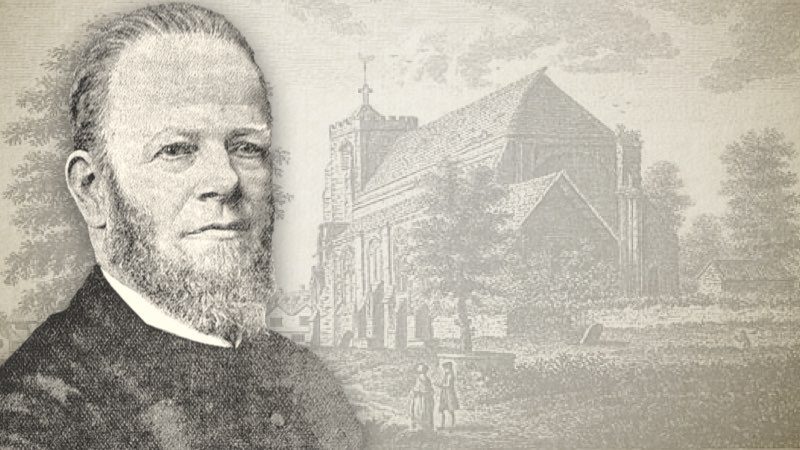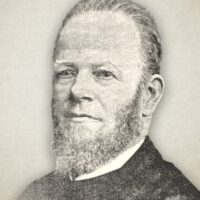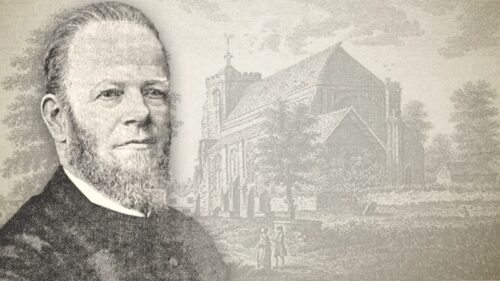
The Life And Ministry Of William Winters
Earthen Vessel 1891:
W. Winters, Waltham Abbey
The courteous request of the Trustees of the Earthen Vessel and the Gospel Herald, as published last month, will, I hope, sufficiently account for the appearance of the portrait in the present issue, as also the annexed autobiographical sketch, without any apology from me.
I was born at Walkern, a small but pleasant village in the county of Hertford, on August 31st, 1834. My beloved father died when I was an infant; and, from what I long afterwards gathered from the lips of my dear mother, I believe his end to have been a most triumphant one. A few minutes before his death, taking me from the arms of my mother, he solemnly charged her, if both of us should be spared, to keep me under the sound of the Gospel; and I must say that no mother ever struggled more than she did during my boyhood days to fullfil his last loving request. But, to my great shame, I acknowledge that when only quite a child I rendered her obligation the more difficult from my willful perverseness in the ways of sin and Satan. I would just mention here, to the praise of God’s grace, that the death of my father was the means God used in bringing my mother to a saving knowledge of Himself, and which was one reason why she so constantly endeavoured to carry out his injunction in keeping me under religious training. I believe that my father was called by grace under a sermon preached in the open air in the village, and I have understood that my godly uncle, Nathan Warner, late of Brentwood, was called of God at the same time. I have also heard from my dear uncle James Winters, of Walkern, that my father was instrumental in his conversion. To God be all the glory!
Owing to my dear father’s death, I was removed in providence, at the age of four years, to Waltham Abbey (my mother’s native place), where I have remained ever since. I have nothing to record of particular interest respecting my childhood days, other than the sharp conviction of sin I experienced at the age of eight years. I well remember having done something wrong at that time which grossly offended my dear mother, and which caused me much heart-sorrow. When I retired to bed, sobbing and crying, she came to me and said, “Never mind, I’ll forgive you;” but I cried the more from the fear that I had offended God, and said, “Yes, mother, I know you will, but will God forgive me?” Since then I have learned that conviction is not conversion, and conversion is not regeneration, but the fruit of it. I regularly attended the Baptist Sunday-school in the neighbourhood for a long time; but as years rolled on I resolved to go elsewhere, and consequently visited most of the places of worship in the locality, mainly with a view of gratifying my mother, who constantly urged me not to desert the public means of grace. At last I settled down for a time among the Episcopalians, but, finding their ritual dull and formal, I eventually left them, and became attracted by the zeal and warmth of the Wesleyans, with whom I united, and soon caught a little of their fire by attending their Sunday and week-night services. The nature and mode of their teaching I found quite congenial to my natural temperament. I therefore laboured hard, early and late, to obtain salvation by the deeds of the law, being totally ignorant of Jesus Christ and salvation by free and sovereign grace. In the darkness of my mind I became thoroughly proud of my religion, and thought if any one deserved to go to Heaven I did, as I had done my duty to God and man in every possible way, and had lived for some time without committing any known open sin. Also, with religious motives (supposing “cleanliness to be next to godliness”), I washed my sinful flesh many times a day, without the slightest knowledge of the necessity for the washing of regeneration by the Holy Spirit, and faith in the blood of Jesus Christ.
This kind of ultra-Pharisaism, however, collapsed after a short trial of about three years, and I went pack into the world, and lost nearly all religious feeling and energy, although I did not entirely forsake public worship. About the year 1856 a thorough change occurred in my mind, such as I had never before experienced. I then occasionally attended the large Baptist chapel in the town, but more frequently the little Strict Baptist chapel, a place I had previously avoided with feelings of horror (although my dear mother regularly worshipped there), because of the dreadful doctrines which I imagined were preached there. For some time before and after attending the ministry there, I constantly expressed to my mother my utter detestation of the sovereignty of God, and many fierce religious battles ensued between us about free-will (or self-will), and free grace. At the same time I was fully convinced of the genuineness of her religion, and believed she possessed that which I was then destitute of, vital godliness; but the harsh and hard sayings I uttered against her convictions and against God’s sovereignty in the election of His people without creature works, caused me much pain and sorrow afterwards. My dear mother died Feb. 10, 1870, aged 59.
The preaching in the little chapel was the means God employed in breaking my stubborn heart. I then felt my condition to be a lost one, I envied the beast I saw grazing in the marshes, and the dogs in the streets, because I knew they had no souls to be either saved or lost. I was afraid for a long time to go to bed lest I should die in my sleep and go to hell, and when awake I feared the earth, as I walked about, would open and swallow me up. After awhile light broke in upon my mind through the preached word, and my language was like that of the woman of Samaria, “Come see a man which told me all things that ever I did.” My character was so clearly described by the preacher that I declared he knew more about me than I did myself. I knew what he said was according to God’s Word and my own experience, and was, therefore, much comforted by it. I was also very greatly blessed under a sermon by the late Robert Bird, of Cranmer Court, Clapham Rise, from the words of Christ in Mark 10:51: “What wilt thou that I should do unto thee?” My answer was, with the blind man, “Lord, that I might receive my sight.” I visited Mr. Bird on his dying bed, and when parting with him, he said, grasping my hand, “God has a great work for you to do;” but I had not the remotest idea what that work could be. I was then very eager for something to satisfy my soul, but I hardly knew what, and the first hymn I found to suit my case was the one (Denham’s Sel. 551) beginning as follows:—
“Lord, give my soul a strong desire
After Thy glory to aspire,” &c.
I had no knowledge before that such a hymn was in the book. Psalm 51 and Romans 7 were most precious portions to my soul, as they are to-day; also “A Dialogue between a Believer and his Soul,” by Hart; Dr. Watts’ Lyrics, and Paraphrases of Solomon’s Song; Quarles’ Emblems; Swain’s “Redemption,” Hymns, &c.
As there was no service during the week at the little chapel I joined a class of young men for the study of the Bible at the large chapel; but as they rejected my experimental answers to their questions, I retired, feeling no union whatever to them. The pastor of the cause with which these young men were connected wished me to join his Church, but I told him, after hearing him a great while, that his ministry much troubled me, because he preached that which I found impossible to perform. He also expressed that Newton’s hymn, which was very dear to me, ought not to be used, viz.:
“‘Tis a point I long to know,
Oft it causes anxious thought.”
Talking with him one evening in his study, he asked me before leaving to pray. I tried, but not having prayed in the presence of any human being before, I felt that I should sink through the floor; and my only hope was, that he, being deaf, did not hear me. He then gave me a pocket Testament with the words of Paul in 2 Tim. 3:15, written on the fly-leaf. Some time elapsed before I fully enjoyed Gospel liberty, which was brought about without the use of any means. Although I dearly loved the people of God, yet I was not clear in my mind as to the distinction between law and Gospel. I thought there must be something for me to do, and I tried to do it with all my might, by reading a certain number of chapters of the Bible daily, and strictly guarding my words and ways, and then calculating at the end of the day how far I bad succeeded; but I invariably failed to fullfil satisfactorily the task I had set myself to do. This kind of drudgery continued, until one morning as I was standing alone near the head of a river, and in a state of despondency at my miserable failures, the words in James 2:10 rushed into my mind, and crushed all my legal doings at one stroke. In that hopeless state I was allowed to remain only for a short time. Before leaving that spot I saw Jesus by faith as clear as the sunlight, and in a way I had never seen Him before. I felt humbled at the sight by a sense of my unworthiness, yet overwhelmed with joy. Jesus then appeared as my all-sufficient Saviour, and met my condition in every way. He also graciously confirmed His love to me afterwards by the words in Jer. 31:3, which came twice to my heart with great power and sweetness. I cannot now express the happiness I felt and the real love of heart I had to Jesus Christ. In the same joyous state I was privileged to remain day and night for five years, and thought the rapture would always abide. I then said with David (Psalm 30:7), “Lord, by Thy favour Thou hast made my mountain to stand strong,” but afterwards I was taught the experimental meaning of the latter part of the same verse-i.e., ”Thou didst hide Thy face, and I was troubled.” Since then the days of darkness have been many (Eccles. 11:8); but one sweet portion from God has often quieted my heart in distress, and is a comfort to me today-viz., Phil. 1:6. I was then much perplexed as to which of the three glorious Persons in the Trinity to address at the throne of grace, when suddenly the following words came to my mind, as though audibly spoken, “All power is given unto Me in heaven and in earth.” I at once turned to the Scriptures, and found the words in Matt. 28:18, and have never been troubled about the matter since. In the providence of God I married Mary, the eldest daughter of James and Mary Maynard, June 29th, 1858, and settled down in the home in which I now live. Words fail to express her real worth to me. Praise the Lord—
“Whose bounteous hand with needful good, has made my cup run o’er,
And in a kind and faithful friend, has doubled all my store.”
On the 8th of July following I was baptized and received into the Church of which I am still a member. In the course of time the friends appointed me to the office of deacon, but my soul was greatly exercised respecting the work of the ministry, and for more than sixteen years I bore the inward conflict without mentioning the matter to anyone but God. At last, as I could endure the struggle no longer, I felt constrained to open my mind to an aged minister about it, and he strongly persuaded me not to hesitate in taking engagements if the Lord should send for me, and, strange to say, a dear brother now with God, who had no knowledge whatever of my then state of mind, wrote requesting me to take a week-evening service for him at his chapel, and would take no denial. I regarded the matter as the voice of God, and went praying and trembling all the way, and spoke from Rev. 5:1; and to my utter astonishment the senior deacon and friends begged of me to visit them again. But I thought I had said all I knew, and therefore determined at the time never to take another service. However, God ordered it otherwise. A considerable time before speaking in public, the words in Jer. 15:19 came with force to my mind, and have been a source of comfort to me many times since. I knew not their import until led of the Lord to speak in His name. My friends at Ebenezer, Waltham Abbey, would not agree that I should itinerate, but secured me at once as their pastor, and thus I have through grace spent the greater part of my life in union with them, first as a member, then as a deacon, and lastly as a pastor; but the result of my labours at home and elsewhere I leave with God to reveal at the last great day.
I cannot of course say anything here about the literary pursuits I have been engaged in at various times during the past twenty-five years, but must content myself with having given a few bald notices of the experience of my soul in divine things, and conclude by quoting the annexed lines of Addison’s beautiful hymn on providence, which are sweetly suited to the feelings of my heart.
“When all Thy mercies, O my God,
My rising soul surveys,
Transported with the view I’m lost
In wonder, love, and praise!
“When in the slippery paths of youth,
With heedless steps I ran
Thine arm unseen conveyed me safe,
And led me up to man.
“O how shall words with equal warmth
The gratitude declare,
That glows within my ravished heart?
But Thou canst read it there.
“When nature fails and day and night
Divide Thy works no more,
My ever grateful heart, O Lord,
Thy mercy shall adore.”
William Winters (1834-1893) was a Strict and Particular Baptist preacher. In 1876, he was appointed pastor of Ebenezer Strict Baptist Chapel on Fountain Place, Waltham Abbey, where he remained until his death. He was also a religious journalist, historian of Waltham Abbey, bookseller, hymn-writer and editor for the Earthen Vessel, Gospel Herald and Cheering Words.




